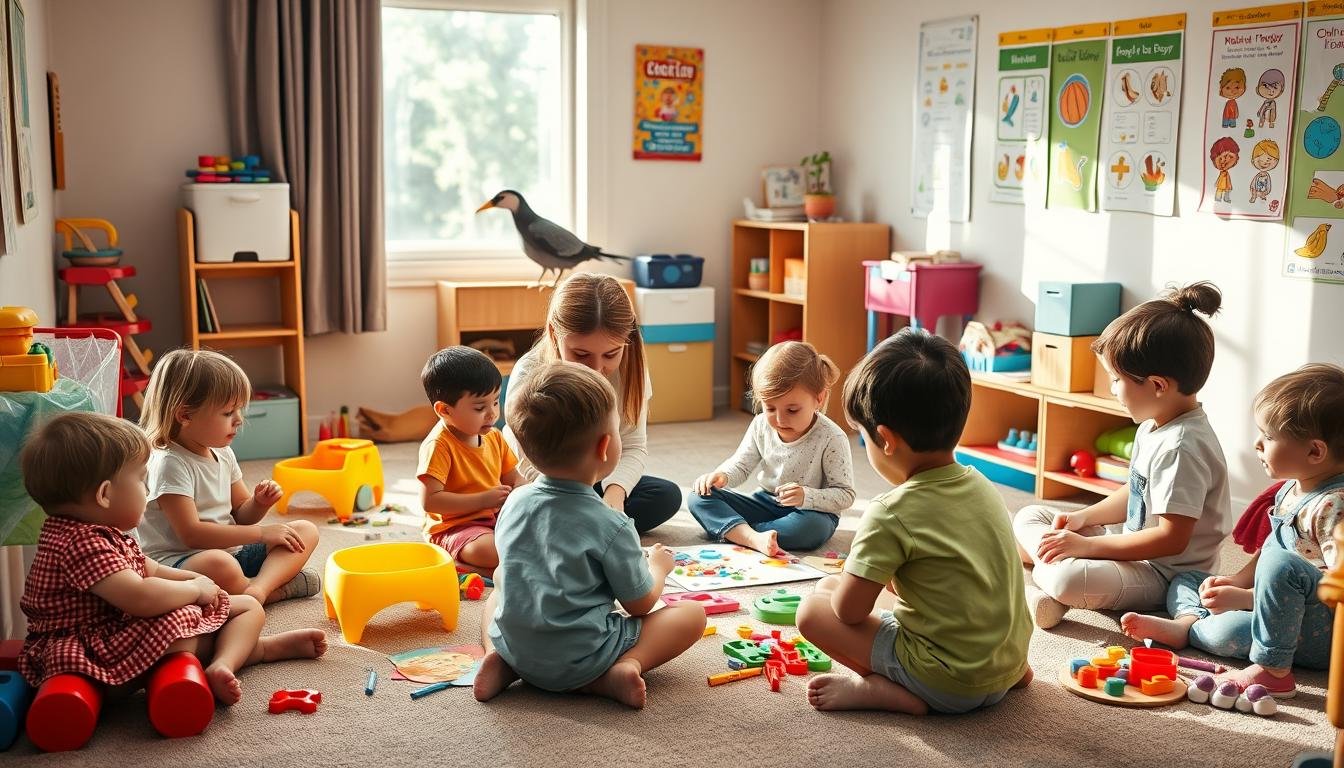Every word spoken by a child marks a step towards lifelong communication. For some kids, speaking comes easily. But for others, early speech therapy can make a huge difference. Imagine transforming silence into a stream of words. That’s what pediatric speech therapy does, one sound at a time.
Every conversation starts with a single word. In their early years, a child’s brain grows rapidly, forming new connections with each new phrase. But sometimes, there are warning signs—a child’s vocabulary stays small, their sentences incomplete, or they avoid eye contact. These subtle signs of speech and language delays are important to notice.
By 18 months, a child should know at least 50 words and be more clear when they speak. By age three, anyone should understand their speech. What if the progress stalls? This is when speech therapy for children becomes crucial. It’s more than teaching them to articulate. It’s about improving their overall ability to communicate and connect with others.
Parents should feel assured their child’s speech development is being supported, not just hoped for. Early assistance from speech therapy experts is key. It’s about using every game and strategy to inspire improvement. When a child starts to speak and be understood, the success is shared by all who supported them.
The Critical Impact of Early Speech Therapy on Childhood Development
Early language intervention plays a big role in a child’s growth. It’s crucial to tackle speech and language delays before the age of three. At this time, a child’s brain is very adaptable, making it easier to learn new things. This stage is important for reaching language goals and boosting brain development.
One key advantage of speech therapy is stopping speech issues early on. These problems could affect a child’s school performance and friendships later. Early treatment helps improve how kids talk and interact with others, boosting their confidence. A team of experts works together to meet each child’s needs.
Here’s what early speech therapy can do:
- It greatly improves thinking and talking skills, using the child’s natural ability to learn.
- It stops behavior problems and lowers the chance of school issues later.
- It makes socializing better and stops kids from feeling left out by helping them communicate.
- It gives care that fits the child’s own challenges, making improving speech and language skills easier.
- It gets families involved, which is important for helping the child when they are not in therapy.
The Centers for Disease Control and Prevention (CDC) says early help can change a child’s path. Parents and caregivers can build a strong base for their kids’ future learning and friends. Starting early is key to their best chance at success. Teachers in preschool are also important. They add language learning to everyday class stuff, helping what speech therapists do. This way, children get better at talking and do well in other areas too.
Ultimately, early speech therapy aims to do more than fix speech problems. It gives kids the confidence and abilities they need for school and making friends. By focusing on early help in speech therapy, we set up our young ones for happier, more successful lives.
Recognizing the Early Signs of Speech and Language Delays
It’s important to know if a child isn’t hitting communication milestones on time. This helps you quickly get help from a speech expert, aiming for a better outcome. Spotting early signs of speech problems might not be easy. But with the right knowledge and attention, you can notice them.
By 6 months, for instance, babies often start babbling. By their first birthday, most can say simple words like ‘mama’ and ‘dada’. They also begin to use gestures. Kids usually build a vocab of around 50 words by age 2. By age 3, they start putting words together to make sentences.
| Age | Expected Speech Milestones | Potential Warning Signs |
|---|---|---|
| 6 months | Babbling | Lack of babbling or repetitive sounds |
| 1 year | Simple words (mama, dada) | No use of gestures or simple words |
| 2 years | 50-100 words, two-word phrases | Fewer than 50 words, not combining words |
| 3 years | 1,000 words, three-word sentences | Difficulty forming simple sentences |
| 4 years | Complex sentences, recognizes letters | Struggling with sentence structure, limited vocabulary |
If your child isn’t babbling, using jargon, or saying “bye-bye” by 18 months, seeing a speech pathologist is a good idea.
Kids grow at their own pace, but skipping key communication steps should signal to ask for help. This way, you can catch any issues early. It ensures your child gets the right support to develop their speech and language skills well.
Speech Therapy for Kids and Academic Success
Speech therapy is crucial for kids’ academic growth. Parents need to understand this to give their children a good start. It affects early learning and a child’s future success.
Therapists focus on phonemic awareness, key for reading. This skill helps kids notice and work with sounds in words. It’s vital for reading and spelling.
Speech therapy boosts kids’ academic performance. The National Early Literacy Panel found that understanding and talking early predicts literacy success. But speech therapy does more than help with reading. In kindergarten and preschool, kids need to talk to learn and interact. This means communication skills are more important than ever.
Kids with untreated speech problems face many academic hurdles. These issues make it hard to follow instructions, take part in class, and share ideas. Targeted speech therapy, using playful learning, can help. Parents can support their kids using tools like speech therapy exercises at home.
| Age | Speech Milestones |
|---|---|
| 12 months | Babies begin to say simple words like “mama” or “dada”. |
| 18 months | Know about 20-50 words. |
| 2 years | Begin forming two-word phrases like “want cookie”. |
| 3 years | Word count can grow to 200-300 words. |
| 6 years | Can speak in complete sentences and follow multi-step directions. |
The goal of speech therapy is long-term. It prepares children for school and life. Early help with speech issues makes a big academic and social impact.
Empowerment Through Speech Therapy: Social, Emotional, and Linguistic Benefits
Speech therapy empowerment deeply impacts both children and adults by developing essential life skills. It covers more than just improving speech. Early help makes a big difference in emotional health and social abilities too.
The benefits for young kids who start speech therapy early are huge. According to the American Speech-Language-Hearing Association, children facing communication issues make notable progress with timely help. This not only helps their speech but also boosts their confidence in social situations.
Building strong communication skills has a wide impact. Kids who can express themselves clearly get frustrated less often. These skills are crucial for making friends and doing well emotionally. It also helps children feel better about themselves and their learning journey.
During social skills therapy, strategies like role-playing and feedback help improve basic social skills. These include saying hello, making eye contact, and understanding hints or jokes. Such detailed therapy helps each person, whether a child or an adult, with their specific needs.
Speech therapy benefits everyone, not just kids. Adults and children can improve their social skills with customized therapy plans. It helps overcome problems like stuttering or trouble pronouncing words, enabling clearer expression and better relationships.
In the end, speech therapy changes lives by solving immediate communication problems and laying a strong foundation for the future. It gives people confidence to share their thoughts and feelings. This opens many doors for success and happiness in various areas of life.
Understanding Early Intervention: A Guide for Parents and Caregivers
Exploring the early intervention importance in childhood is key. It lays the groundwork for a child’s future. Early intervention targets speech and language skills in kids from birth to three years. It consists of a team with speech-language pathologists, occupational therapists, and developmental experts. They all work together to help your child grow.
Early intervention isn’t just about speech needs. It also looks closely at developmental milestone support. Kids learn fast in their early years because their brains are developing quickly. This makes it a perfect time for effective intervention. Not speaking single words by 12 months or having trouble with sentences may signal the need for an evaluation.
Involving parents is a key principle for us. Parent guidance in speech therapy is vital. When you understand the therapy goals and take part, you bring the therapy home. This creates a supportive home environment that boosts communication. It reinforces strategies from therapy sessions.
Early intervention plans are tailored to meet your child’s specific needs. These are usually part of an Individualized Family Service Plan (IFSP). This plan covers therapy and goals for other areas like walking, thinking, and social skills.
The benefits of early intervention are vast. Children who get speech therapy early are often more ready for school and friends. They build strong language skills, important for reading, writing, and talking effectively. Also, early help can avoid or lessen learning troubles or social challenges.
Early intervention is a team effort. It includes caregivers, therapists, and sometimes, teachers. It shows the early intervention importance not just in therapy but in education too. This comprehensive approach supports the child’s overall growth.
To wrap up, early intervention helps children with speech and language issues not just now but for the future. The role of speech-language pathology is crucial. It helps kids reach their full potential and paves the way for success in education and social life.
Conclusion
We’ve looked at how speech therapy helps kids grow in many ways. It tackles problems like articulation, language delays, fluency, voice disorders, and social issues. By getting involved early, parents can help their kids thrive and lessen the impact of communication problems. Speech therapy isn’t just about getting better. It’s about giving our kids confidence and the skills to face the world.
Speech therapy assessments and plans are tailored for each child. Activities like play and storytelling, along with proven methods from places like Kids Miracle Steps, make a big difference. This kind of therapy doesn’t just improve talking. It boosts friendships, school success, and emotional strength. The ripple effect is huge, leading to better social skills, school performance, and life quality.
Reflecting on speech therapy shows how key parental support is. Your effort is crucial for your child’s progress. By spotting issues early and working with experts, you make a big difference in your child’s life. We’re with you on this journey, with our understanding, tools, and a community ready to support. Let’s keep helping our children grow, learn, and win, one word at a time.






